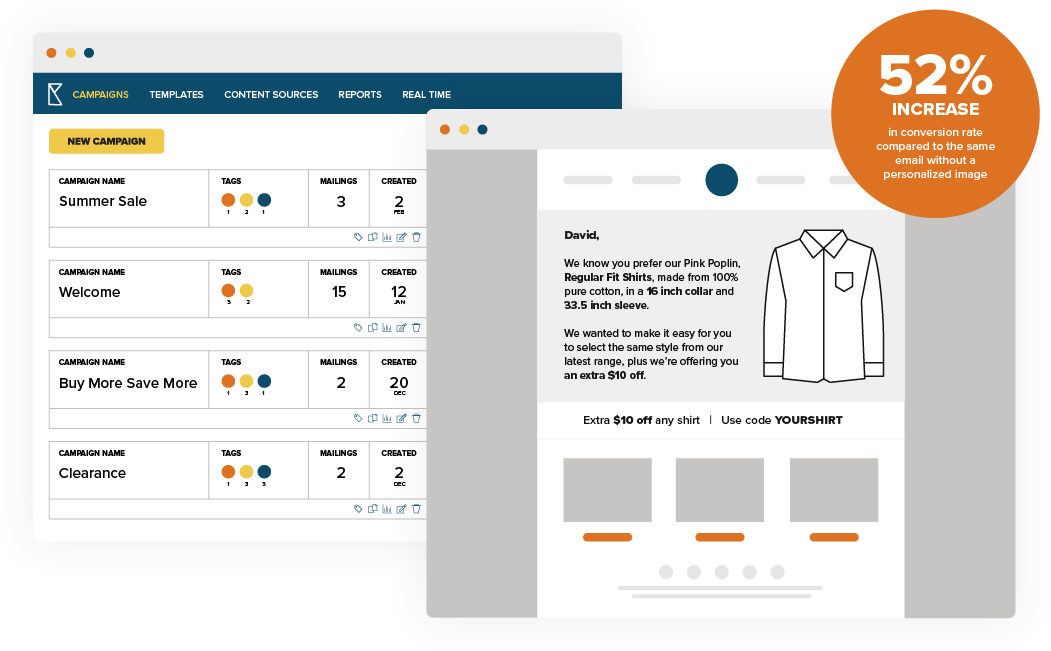Why Is Personalized Marketing Important?
Personalization gives marketers an opportunity to position a brand or company differently from competitors (even when the product or service is a commodity). Done correctly, personalized marketing becomes a value-add that makes it easy for consumers to find exactly what they want—whether that’s a product, service, a trusted advisor, or information.
Businesses that personalize their marketing see more customer recommendations, referrals, and more repeat purchases—and it pays off.
McKinsey says companies that use a personalization marketing strategy may see a revenue lift that ranges from 5% to 25%, depending on the industry. In fact, it’s become so common that more than 70% of customers now consider it a basic expectation.
What is personalized marketing?
Personalized marketing is often referred to as one-to-one marketing (or 1:1 marketing). It uses some type of known personal information to tailor a message to customers or potential customers. By contrast, more traditional marketing that is not personalized delivers the same message to a broad audience.
Th tactic and level of sophistication and data collection involved in personalization runs the gamut. It may be based on widely available (but individual) data like a person’s name, their birthday, what they’ve bought in the past, or types of messages they’ve responded to in the past. When personalization is used, the marketing messages sent to customer A will not be the same as the marketing messages sent to customer B.
(Keep in mind that while personalization is sometimes mistakenly used interchangeably with segmentation—they’re not the same thing).
Why is personalized marketing used?
Customers have options when it comes to where, when, and how they buy and make purchase decisions. Some buy online, others visit a store. In a B2B scenario, a prospect or buyer may prefer to visit a businesses’ physical location. Other customers may decide to buy based on what they’ve seen in an email campaign, or on social media platforms. Now that more products and services are available in a always-on or near 24/7 business model, companies cannot assume that brand loyalty exists or will self-maintain. Factors like physical proximity, selection, style, quality or even price are no longer enough to win a customer over, or keep them coming back.
Whether or not they realize it, consumers see personalization strategies at play in nearly every facet of their life. From show recommendations on streaming services to product recommendations when they visit a website, marketers are using relevant data to give the user a better experience that’s tailored to their interests.
The good news for marketers who’ve already tried their hand at personalized marketing? It worked! Many consumers have become so impressed by this improved customer journey that they expect every company to treat them in a way that makes them feel valued, and understood.
AdAge reports that 44% of customers will take their business elsewhere if they don’t get a personalized experience.
What are the benefits of personalized marketing?
Personalized marketing can deliver measurable and tangible benefits for businesses—but let’s be honest. It’s not anywhere near as easy to execute as a traditional marketing effort that treats most customers the same. In fact, a study by Gartner reveals that 63% of digital marketing leaders are struggling with personalization.
A personalization strategy will likely introduce new questions for marketers regarding how to properly collect and manage data, and apply it to appeal to the specific interests of the individual. But that should not be a reason to fear or avoid it.
3 reasons personalized marketing can drive better results
1. Personalization can improve customer experience
Two factors have historically been credited for driving customer experience: people and product. But customers in the United States spent more than $870 billion online in 2021. How many sales—and how much of the sales cycle—still involves human interaction?
Personalization should now be considered a part of the customer experience, now that so few customer interactions involve a “people component.”
Effective personalization can:
- Guide customers to an appropriate product based on their interests/behaviors
- Help them make comparisons
- Find answers to their questions
2. Personalization can expedite conversions
Meeting the customer with the right message at the right time in their journey makes their buying decision easier. Personalized marketing can take on many forms—from customized video messages or images, to personalized email marketing messages to featured content or products based on past interactions.
No matter the channel, the end goal is the same: give the user a reason to perform whatever next action it is that you want them to take. When the message is personally relevant, you increase the likelihood that will happen.
3. Personalization can drive revenue
AdAge reports that 60% of consumers are more likely to buy from a company again once they’ve had a personalized experience. The exact revenue lift a company can expect f depends on industry and the nature of the relationship, but McKinsey estimates that digitally native brands with access to first-party data may see a revenue lift as high as 25%.
Even those with limited first-party data access or without a direct customer relationship may still see a revenue lift of up to 10%, simply by personalizing.
Email personalization is the perfect place to start
Email marketing is one of the first channels that lent itself to personalized marketing, by way of the subject line. Now, the possibilities for email personalization range from adding a person’s name to an image, to using shopper-generated content to personalize product feeds, to using timed content to drive a sense of urgency.
Individualized messages create an impactful customer experience that can lead to bigger results—and email is the perfect place to start.

| Create individualized email experiences at scale Get powerful results with uniquely personalized, engaging email experiences that boost customer loyalty and drive revenue. |

Stephanie Christensen
Stephanie Christensen was the Director, Content Marketing at Litmus
